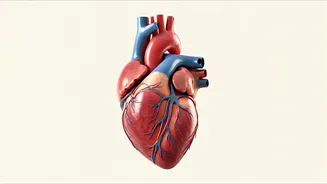Recognizing Early Warnings
Heart health is a critical concern, and early detection is vital for effective management. Subtle indicators can often hint at underlying issues, making
it important to be aware of potential warning signs. These may range from persistent fatigue and shortness of breath to chest discomfort or irregular heartbeats. Recognizing such symptoms can prompt timely medical intervention and prevent more serious complications. Being vigilant about changes in your body, particularly concerning the cardiovascular system, allows for proactive healthcare management.
Prevention: Lifestyle Choices
Adopting a heart-healthy lifestyle is a cornerstone of cardiovascular wellness. This involves a multifaceted approach, encompassing dietary choices, regular physical activity, and stress management techniques. A diet rich in fruits, vegetables, whole grains, and lean proteins, while limiting saturated and trans fats, is essential. Engaging in moderate-intensity exercise for at least 150 minutes per week, or vigorous-intensity exercise for 75 minutes, can significantly improve heart health. Additionally, incorporating stress-reducing practices, such as yoga or meditation, further supports cardiovascular well-being, decreasing the risk of heart-related issues.
Natural Aids for the Heart
Alongside conventional medical approaches, certain natural remedies can support heart health. Several dietary options have been recognized for their beneficial effects. Foods like seeds, especially those rich in omega-3 fatty acids, can help lower bad cholesterol levels and improve overall heart health. Similarly, incorporating lemon water into your daily routine can provide various health benefits, including contributing to a healthier heart. Such natural aids, when integrated into a balanced lifestyle, can provide added support for maintaining a robust cardiovascular system and managing risk factors.
Understanding Key Indicators
Comprehending key health indicators offers insight into your heart's well-being. Key metrics include blood pressure and cholesterol levels, as these numbers significantly influence heart health. High blood pressure, if unmanaged, can strain the heart and increase the risk of cardiovascular diseases. Elevated cholesterol levels, especially LDL or 'bad' cholesterol, contribute to the buildup of plaque in the arteries, potentially leading to blockages. Regular monitoring of these indicators, coupled with lifestyle adjustments and medical guidance, can help maintain optimal cardiovascular health, thereby reducing the chances of related health concerns.
When to Seek Help
Prompt medical attention is critical when dealing with potential heart issues. If you experience chest pain, shortness of breath, irregular heartbeats, or any unusual symptoms, it's essential to consult a healthcare professional. Early diagnosis and intervention can prevent severe complications and improve long-term outcomes. Furthermore, individuals with a family history of heart disease or other risk factors should proactively discuss cardiovascular health with their doctor. Regular check-ups, especially for those in higher-risk categories, are crucial for early detection and effective management of heart-related problems.
















